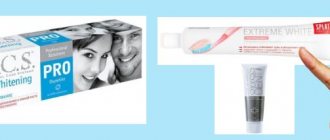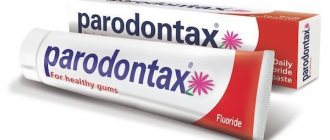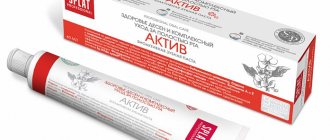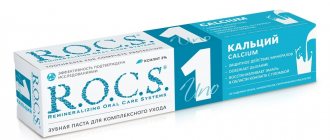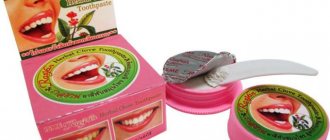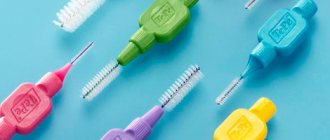Toothpaste - for every taste and budget
People always tried to monitor oral hygiene, using the most unusual means. For example, in Ancient Egypt, teeth were cleaned with ash and sand; in ancient Scandinavia, wool and chalk were used for this procedure, and in medieval Europe, even glass and coal. Russia had its own method: tooth enamel was cleaned with eggshells, and then with the resin of coniferous trees. Today we use toothpaste.
The Russian market offers many toothpastes from different countries, manufacturers and price categories. Such a wealth of choice, on the one hand, pleases, but on the other hand, it sometimes confuses us, because choosing the right toothpaste is half the success of preventing, and sometimes treating, caries. As a rule, we rarely read the composition of the paste, recommendations for use, most often we just buy what is intrusively advertised on television and radio.
The Roskontrol consumer rights protection society decided to find out which toothpastes are safe for our health and which do not meet accepted standards. ROCS Double Mint toothpaste Blend-a-med toothpaste “ 3-Effect Soft Freshness / 1-2-3 ”, Toothpaste with a light mint aroma “ New pearls Colgate Toothpaste Triple Action Natural Mint , Professional Series Toothpaste Splat Active/Active , Lacalut Fluor Preventive Toothpaste Aquafresh Maximum Toothpaste .
Reviews
Angelina, 30 years old, Izhevsk: In our arsenal there is both children's and adult Aquafresh paste. It gently and thoroughly removes plaque, smells pleasant, and leaves a minty taste in the mouth after cleaning. Suitable for the whole family, as it has a safe composition.
Irina, 42 years old, Moscow: Mint three-color toothpaste for home comprehensive care for teeth and gums. It’s inexpensive, can be used by children and adults, and for the last few years I’ve been buying it mainly.
Igor, 32 years old, St. Petersburg: Regular toothpaste without special abilities - removes bacteria, refreshes, cleans plaque. The hype around it is only because of good advertising - other products are no worse, but at the same time cost several times less.
Stanislav, dentist, 40 years old, Yekaterinburg: A good budget product, suitable for daily home use. Suitable for the prevention of caries and inflammatory diseases of the oral cavity. Approved for use by both children and adults.
So, Aquafresh is a universal toothpaste for complete oral care, has a pleasant mint aroma, and is suitable for children and adults. This product copes with basic dental tasks - cleans teeth from plaque, provides fresh breath, copes with pathogenic microorganisms, and prevents caries and inflammation.
Test results
| Product | Grade | ||
| Lacalut Fluor Lacalut toothpaste is distinguished by its rather high cost, but the quality turned out to be decent - the paste contains a sufficient amount of fluoride and is pleasant to the taste. | 78 | ||
| "3-effect", Blend-a-med Blend-a-med toothpaste ranked high in taste and cleansing properties. In addition, this sample contains a high fluoride content - this paste is best suited for people living in areas with a lack of fluoride in water. | 77 | ||
| "Double Mint", ROCS Expensive but high quality toothpaste. Does not contain fluorine, therefore it is recommended for use by residents of regions with excess fluoride in water. | 75 | ||
| "Maximum" Aquafresh Aquafresh toothpaste has good cleansing properties and a pleasant taste. The sample contains a fairly large amount of fluorine, however, its actual content is 3.5% less than stated in the labeling. | 70 | ||
| "Colgate" Colgate toothpaste has a pleasant taste and smell and good cleaning properties, but the actual fluoride content in it differs from what is indicated on the label. In fact, the fluorine in the paste contains 17% less than stated. | 71 | ||
| "New Pearl" Affordable toothpaste “New Pearl” has a pleasant taste and smell and good cleaning properties, but the actual fluoride content in it differs from that indicated on the label. In fact, the fluorine in the paste contains 20% less than stated. | 70 | ||
| "Splat Professional" The paste does not have the most pleasant taste, but it cleans tooth enamel well. Experts found a discrepancy in information about the fluoride content on the tube and on the product box, which is a violation. | 66 | ||
Peculiarities
Aquafresh brand teeth cleaning pastes have a complex multi-component composition. But the following components are taken as a basis:
- calcium carbonate;
- fluorine system binary;
- calcium glycerophosphate.
Fluoride-containing substances provide reliable protection against caries; they also help to significantly increase the resistance of tooth enamel to various acids and counteract bacteria that stimulate the production of harmful acids.
In addition, toothpastes may contain other additional elements in their composition, including sodium sulfate, various harmless flavors, sodium fluoride, zinc chloride and citral.
Is fluoride normal?
Fluorine is a vital element for the body. It is especially important that adequate amounts of fluoride enter the human body, since it is a component of tooth enamel. With insufficient or excessive fluoride consumption, the formation of tooth enamel is disrupted and dental diseases develop. With a lack of fluoride, caries occurs. With an excess of fluoride, fluorosis occurs (first, white spots appear on the teeth, then yellow and brownish, and then the bones are affected).
, Blend-a-med , Lacalut and Aquafresh
toothpastes contained the most fluoride , while ROCS had none.
In the labeling on the tube of Splat Professional toothpaste, however, in fact, fluoride was found in the amount indicated on the secondary packaging - the box in which the tube is enclosed. Such labeling, which contradicts itself, is a serious violation. According to experts, the fluorine content in none of the samples exceeds the level allowed by technical regulations. (Technical Regulations of the Customs Union TR CU 009/2011 “On the safety of perfumery and cosmetic products”). It is worth noting that the benefits of fluoridation of toothpastes are questioned by some doctors.
Is fluoride in toothpaste harmful or beneficial?
Andrey Mosov, head of the expert direction of NP Roskontrol, doctor: “The need for fluoride for the formation of tooth enamel is not questioned by any of the specialists: they only argue about whether fluoride enters the body through local penetration into the dental tissue or with a small amount of dental paste that is swallowed when brushing your teeth. One way or another, the preventive and even therapeutic effect of fluoridated toothpastes in relation to dental caries can be considered proven. Toothpaste without fluoride is necessary only in those regions where there is an excess of fluoride in drinking water - for example, in some settlements in the Moscow region. You can find out about the situation specifically in your area of residence at the dental clinic or the local Rospotrebnadzor office. If we talk about Moscow, where the water supply is from a surface source - river water, poor in fluoride - then the use of toothpastes with fluoride is mandatory here.”
How to choose?
There are some important selection criteria that you should pay special attention to before purchasing the right teeth cleaning formula.
Be sure to pay attention to the composition of the substance. To buy a safe toothpaste option, you need to pay attention to the ingredients it contains. All of them are produced with additional elements that can whiten, polish teeth, have a healing effect, or simply help strengthen teeth and gums.
If you don’t have any difficulties with them, then it’s better to select and purchase a hygiene product for preventive purposes and use it daily . As for special medicinal compositions, it should be remembered that when purchasing them, it is necessary to take into account the recommendations of dentists.
Special pastes will help reduce the level of sensitivity and will prevent subsequent tooth decay. As a rule, this is achieved, among other things, due to the presence of calcium and strontium salts in the paste.
If you have wounds on the mucous membrane, then preference should be given to products with an antibacterial or antiseptic effect. They are typically used in small courses.
If you have caries on your teeth, then you should purchase a substance specifically designed to remove it. Dental hygiene products for caries include many different useful components. Moreover, the necessary element is calcium.
Care should be taken when choosing a composition for a child. It is recommended to consult a dentist first.
For young children, the best option would be a gel paste that does not contain small abrasive particles that can cause harm.
And also, when choosing a toothpaste for children, it is better to avoid refreshing mint products - they can cause a sharp gag reflex in children. It is worth choosing formulations with fruit flavors.
We clean cleanly, without germs and irritation
The cleaning properties of toothpaste are associated with such a characteristic as abrasiveness (Abrasives are small particles of various compounds that mechanically polish tooth enamel). As a rule, calcium carbonate (chalk) or silicon compounds are used as abrasives. You need to understand that calcium carbonate in toothpaste is not a source of calcium and does not have the effect of restoring enamel. During testing, it was found that all samples have a good cleaning effect and meet the mandatory requirements. The best indicator is for Blend-a-med and Lacalut pastes. On the label of the Splat Professional toothpaste, the manufacturer stated a cleaning efficiency of 40.3%, in fact this figure was even higher and amounted to 57%.
Natalya Dmitrieva, Head of the Microbiology Laboratory of the Federal State Budgetary Institution "Central Research Institute of Insectology and Maxillofacial Surgery" of the Ministry of Health of the Russian Federation, Ph.D.
“Based on the results of the examination, it was found that all tested toothpastes meet the requirements for them, that is, the total number of mesophilic, aerobic and facultative anaerobic species is normal. No microbial contamination was detected in any sample. None of the pastes are irritating. All samples tested are non-allergenic.”
Hollywood smile
Many people are sure that they can whiten their teeth without a dentist, at home using toothpaste. You can agree or disagree with this, but manufacturers have adopted this too. Advertising for a beautiful, snow-white Hollywood smile never leaves the screens; on the packaging there is the same thing, perfect, white teeth. So do toothpastes whiten or not?
ROCS, Blend-a-med and Splat Professional pastes claimed a whitening effect. However, all samples participating in testing are not bleaching and do not contain components specific to this type of paste. Most likely, the manufacturers had in mind cleaning the enamel from contaminants - plaque. You can only whiten your teeth properly in the dentist’s office. This will be a professional whitening procedure. Unfortunately, no toothpaste will make your smile as snow-white as in the commercial. Toothpaste can only be expected to cleanse the enamel to its original color.
To create a Hollywood smile, composite veneers are also installed, or a dental restoration service may be suitable.
Marina Volkova, dentist, general director of the STOMADAKT clinic:
“The whiteness of teeth depends, firstly, on heredity. The whitest teeth are in people with blood groups I and II. Secondly, it depends on age: the younger the person, the denser the enamel and the whiter the teeth, and the older the person, the more transparent the enamel and the darker the teeth. Thirdly, from bad habits - coffee, nicotine. Over the course of its life, cracks and scratches form on the enamel. They are filled with food dyes (pigments), which leads to darkening of the tooth color, and nicotine tars sometimes make the situation simply catastrophic. And, of course, no toothpaste can cope with severe darkening of the enamel.”
Aquafresh: what you need to know about “paste for the whole mouth”
The main cause of the development of caries (destruction of hard tooth tissues) and periodontal diseases - gingivitis, periodontitis, periodontal disease (inflammatory and degenerative processes in the tissues surrounding the tooth, leading to loosening and tooth loss) are microorganisms contained in dental plaque and tartar.
In the process of human evolution, living conditions, the nature and composition of food consumed have changed significantly, neuropsychic stress has increased, the prevalence of chronic diseases has increased, and the environment has deteriorated. All of the above are risk factors for the development of dental diseases and their pathomorphosis. New terms have emerged: “blooming caries” (multiple carious lesions of teeth), “rapidly progressive periodontitis”.
In the civilized world, one of the criteria for quality of life is the condition of the oral cavity (teeth and periodontal tissues; see figure). Carious lesions of teeth, gum disease, atrophy of the alveoli cause pain, bad breath, increased sensitivity of teeth to various irritants (chemical, physical, temperature), bleeding gums, loosening of teeth, etc. But the most important thing is the presence of a constant source of infection (odontogenic infection), which can lead to the development of septic complications.
It should be noted that if the fight against caries is on everyone’s lips, and significant progress has been made in this direction (especially with regard to regular oral hygiene, educational programs, as well as the development of modern approaches to caries treatment), then, unfortunately, with the prevention of diseases In periodontal disease, things are different. There are many theories of the development of the pathological process in periodontal tissues, the main etiological factors have been identified (microcirculation disorders, neurodystrophic disorders, activation of lipid peroxidation processes, etc.), and various treatment methods have been proposed. However, at the population level, no noticeable improvement has been achieved: in Ukraine, almost 90% of the population has various periodontal diseases, and primary lesions are detected already in childhood (8–12 years).
Difficulties in diagnosing periodontal tissue diseases are due to the fact that, unlike caries, which is now receiving increased attention, these pathological changes are initially asymptomatic. The process can last for years, and when clinical manifestations occur (bleeding gums, hyperesthesia of exposed necks, tooth mobility), it is no longer possible to eliminate them. In such cases, you can only slow down the pathological process.
Consequently, only a set of preventive measures, including the use of special products for the care of teeth and the oral cavity, can become an effective obstacle to the development of periodontitis and periodontal disease. Periodontal protective agents, like anti-caries agents, must first of all have the ability to eliminate plaque (mechanical removal, suppression of pathogenic microorganisms and neutralization of their waste products) and prevent the formation of tartar.
| Drawing . Tooth structure |
Destruction of tooth tissue by waste products of microorganisms (primarily acids) leads to the development of caries. A certain role in this process is played by the increased content of carbohydrates in food, including sugar, which is fermented by bacteria to form acid.
Why is an acidic environment so harmful to our teeth? It all starts with tooth enamel, the main component of which is oxyapatite - calcium phosphate combined with hydroxyl groups. This compound dissolves well in an acidic environment. The consequences of this interaction are well known: in places where tooth enamel is damaged, pockets of bacterial growth appear, caries develops, which later (if appropriate treatment is not carried out) turns into multi-channel pulpitis. Dental calculus leads to the formation of “pockets” in the gums, in which food debris accumulate, pathogenic microflora develops, at the same time destructive changes occur in periodontal tissues, the gums become inflamed, begin to bleed (symptomatic gingivitis), and later bone tissue is involved in the process and periodontitis develops.
Natural factors for the prevention of these diseases are the consumption of natural food and the normal composition of saliva. In a healthy person, saliva contains a number of components that have protective properties: calcium to compensate for its losses due to dissolution and leaching from tooth enamel, an alkaline reaction to neutralize the acidic environment, and finally, the antibacterial enzyme lysozyme. However, unfortunately, the protective effect of saliva alone is not enough. This is due to three main reasons: hereditary factors (insufficient mineralizing potential of saliva), poor ecology, which disrupts the action of natural defense factors, and, finally, the nature of modern food. Regarding the diet, it should be noted that, firstly, the food is too refined and does not provide the proper mechanical load on the teeth and gums (and often has adhesive properties), and secondly, due to the presence of preservatives in it, it has an increased level of acidity, thirdly, it contains an excess amount of sucrose and other carbohydrates, which are the main nutrient substrate for bacteria. When fermenting carbohydrates, bacteria produce acid that destroys tooth enamel. The situation is aggravated by irregular food intake. In developed countries, three meals a day are replaced by frequent “fast food”, indiscriminate consumption of coffee, juices, chocolate bars, lollipops, etc.
Therefore, to maintain “dental health,” it is important to provide systematic care for teeth and gums—the so-called comprehensive oral hygiene—rather than focusing on “fighting caries.” Experience shows that preventive toothpastes, which have only an anti-caries effect, often provide not only remineralization of damaged tooth enamel, but also lead to the mineralization of deposits on the teeth (tartar), which contributes to the development of periodontal disease. Such toothpastes cannot be recommended for adults for regular oral care.
Tooth powders, toothpastes, hygienic and therapeutic-and-prophylactic dental elixirs are used as comprehensive hygiene products. Abroad, aerosol forms are also used for oral care.
Tooth powders are especially popular among older people; they perfectly polish teeth and remove food debris, and their cost is significantly lower than other hygiene products. However, they also have a number of disadvantages: firstly, it is difficult to introduce any medicinal additives into such a form; secondly, the absence of a dosing device leads to rapid microbial contamination of the powder. In addition, the increased abrasive properties of powders can cause damage to the integrity of tooth enamel.
Multi-component toothpastes can provide optimal therapeutic and preventive effects.
Currently, an urgent task is to create comprehensive hygiene products for the care of teeth and the oral cavity, including toothpastes that have medicinal and therapeutic properties. Such funds must meet a number of requirements.
• Firstly, a modern complex therapeutic and prophylactic paste should have a pronounced therapeutic (preventive) effect in several directions - ensure the prevention of caries, have a periodontal protective effect (prevent the formation of dental plaque, have an antimicrobial and remineralizing effect, have a positive effect on metabolic and regenerative processes in tissues periodontal).
• Secondly, such a paste, like all hygiene products, must be safe. The incidence of side effects that toothpaste ingredients may cause should be minimal. Microbiological purity of products is required (absence of pathogenic microflora). The abrasiveness of toothpaste must meet the standards. The possible negative impact on filling and denture materials should be insignificant.
• Thirdly, the paste must have high consumer properties (taste, aroma, consistency, color range, tube shape, ease of dosing). The pleasant mild taste promotes longer brushing and regular use, and also ensures fresh breath.
• Fourthly, all of the above properties of hygienic products must remain unchanged during long-term storage under certain climatic conditions.
Creating oral care pastes that meet the above criteria is a complex scientific and technological task. To solve this problem it is necessary to use the results of fundamental medical and pharmaceutical research.
According to numerous experimental and clinical studies, pastes for comprehensive oral care of the AQUAFRESH group, produced by the British-American company, are very effective for the prevention of dental pathology. There are several reasons for this. But the main one is that based on the results of large-scale research projects, pastes of a unique composition and structure have been created that have pronounced antibacterial properties, the ability to restore and preserve the structure of teeth, and have a deodorizing effect by eliminating pathological processes in the oral cavity. The composition of AQUAFRESH pastes is multi-component. But there are three main active components: a binary fluorine system (0.75% sodium monofluorophosphate and 0.01% sodium fluoride), calcium glycerophosphate and calcium carbonate. The presence of fluoride is necessary for all modern effective anti-caries pastes. Currently, AQUAFRESH pastes sold in Europe include a couple of the above fluorine-containing components, which provides:
• significant acceleration of the process of remineralization of tooth enamel;
• increased resistance of tooth enamel to acids (fluorine-containing molecules are introduced into the enamel structure);
• counteracting bacterial enzymes that promote acid formation.
It should be noted that the presence of calcium glycerophosphate in AQUAFRESH makes fluorine in the paste more active and accessible, creating optimal conditions for the formation of acid-insoluble fluorapatite on the enamel surface and for replacing calcium “washed out” from the enamel. This combination increases the effectiveness of the protective effect by 10%. The third active component - calcium carbonate - serves to create an alkaline environment that neutralizes acids produced by bacteria and contained in food, which helps restore damaged enamel (remineralization process).
The antibacterial effect of AQUAFRESH is determined by several factors. The main one is the ability to create a unique moisturizing environment that prevents the proliferation of putrefactive bacteria. In addition, a number of AQUAFRESH components also exhibit antibacterial activity: benzoic acid, sodium hydroxide, titanium dioxide, sodium lauryl sulfate. The latter component quite actively dissolves dental plaque, thereby removing areas of bacterial growth. It must be emphasized that it is the unique composition of AQUAFRESH paste that distinguishes it from other similar pastes and ensures high biological activity of the finished product. It is the multicomponent nature and optimal selection of ingredients that contribute to the potentiation of the antibacterial effect of each component. This is especially clearly evident in the example of slowing down the process of formation of dental plaque: calcium glycerophosphate potentiates the preventive effect of sodium monofluorophosphate, the presence of sodium lauryl sulfate also has a similar effect. The main effect of AQUAFRESH is to prevent the destruction of tooth enamel, which is achieved due to the presence of three components: sodium monofluorophosphate, calcium glycerophosphate and calcium carbonate. And finally, the third component of the effect of AQUAFRESH paste (breath freshness) is largely determined by its antibacterial activity, since in most cases it is diseases of the teeth and gums caused by microorganisms that are the cause of bad breath.
A number of components of AQUAFRESH paste make it pleasant to the taste. For this purpose, mint additives have been introduced into the AQUAFRESH pastes: refreshing mint and soft mint (hence the names of the two main types of pastes), containing plant essential oils that have fungicidal and antibacterial activity and help maintain a pleasant breath odor even several hours after application of paste.
AQUAFRESH toothpaste - tri-color. Strips of different colors (white, red and blue/green) contain different components of the paste, which prevents them from mixing in the tube and provides unique storage stability, which is unattainable with conventional technology due to the mixing of dissimilar ingredients.
This technology does not allow the inactivating effect of other components of the paste on fluorides, therefore fluoride ions remain in a “free” state throughout the entire guaranteed shelf life. In addition, this contributes to the long-term preservation of the smell and taste of the paste. It is known that fluoride-containing monomix toothpaste with an excessive amount of flavorings after exposure to a warm room (for example, in a bathroom) can be dangerous for consumers due to the formation of toxic organofluorine compounds.
An important advantage of AQUAFRESH pastes is the fact that the products are manufactured only at pharmaceutical production facilities located in the UK and have a GMP certificate. Therefore, these products are characterized by excellent quality indicators, in particular the absence of microbial contamination.
A description of the advantages of this type of paste would be incomplete without mentioning the AQUAFRESH toothbrush, which is a necessary addition to achieve the maximum therapeutic and prophylactic effect of the paste. Let us remember that chronic injury to the gums when using low-quality toothbrushes also contributes to the development of periodontal disease. The presence of a “flexible neck” in the brush allows you to effectively massage tooth enamel and gums, preventing their injury, and allows you to more effectively “deliver” the active components of the paste to the least accessible areas of the oral cavity, which are “favorite” places for bacteria to grow. Available in several sizes of brushes for children and adults.
The combined use of AQUAFRESH toothpaste and brush is a unique technology for caring for teeth and the oral cavity, which, when used regularly, not only prevents the development of caries, but also leads to a healthier oral cavity for patients of any age.
In addition to the above, it should be noted that all components of AQUAFRESH (including dyes) are harmless in concentrations corresponding to those created in the oral cavity during brushing. The abrasiveness of the pastes is standardized, which allows their use by people with increased sensitivity of dental tissues. And what is very important, AQUAFRESH pastes do not cause destruction of modern filling materials.
Since pastes are medical products, the packaging provides brief information on their use. Children can also use these products, but adult supervision is recommended (to ensure that the minimum doses recommended for children are observed).
The most effective is to use pastes after meals, after rinsing the mouth with water.
As a result of 12-month clinical trials conducted at the Institute of Dentistry of the Academy of Medical Sciences of Ukraine, a pronounced therapeutic and prophylactic effect was established: periodontal indices decreased by 2.2–3.75 times, practically no new cases of caries were noted (0.1%), the degree of whiteness teeth increased by an average of 37%. No side effects have been identified when using the pastes.
Thus, AQUAFRESH pastes (currently GlaxoSmithKline), due to their high effectiveness, clinically proven, can be recommended as the most preferred therapeutic and prophylactic agent for comprehensive hygienic care of teeth and oral cavity.
T.P. Tereshina, Dr. med. Sciences, Odessa Research Institute of Dentistry of the Academy of Medical Sciences of Ukraine
E.L. Levitsky, Doctor of Biology. Sciences, Institute of Pharmacology and Toxicology

